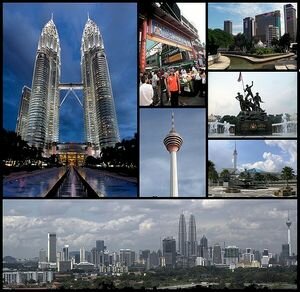Through biometrics, Malaysia calls on legal foreigners to be counted
 ?
?
An OFW Journalism Consortium news flash exclusive
by JEREMAIAH M. OPINIANO
MANILA-FOR days now, and ending on July 31, the Malaysian government is encouraging legal migrant workers -including Filipinos- to register with the authorities' biometrics registration program.
The program, according to Mohamed Fauzi Bin Ismail of Malaysia's Department of Immigration, is part of the government's "6 Ps" measure to count the number of legal migrant workers and provide amnesty to irregular migrant workers.
The Six P's are pendaftaran (registration), pengampunan (amnesty), pemantauan (monitoring), penguatkuasaan (enforcement), pengusiran (repatriation), and pemutihan (legalization), Ismail told participants at a recent regional policy forum on migration management.
The program began on July 18 and ended on July 31. Ismail, who is deputy director of his department's Enforcement Division, is spearheading the registration process.
"We don't have a benchmark figure of how many legal and illegal migrant workers we have in Malaysia, although we are targeting some 1.8 million to get registered," he told participants at the forum organized by the Philippine Institute of Development Studies.
The 6Ps are targeted at irregular migrants who did not have any form of travel documents entering Malaysia, and to those overstaying in the country, who allegedly violated the conditions of their work passes or permits; and who left their employers and worked elsewhere.
Irregular foreigners, on their part, will have their own registration process that begins August 1, Monday.
When these irregular foreigners are registered, the migrants will be given a certificate which, Ismail said, gives them a grace period of three months to go back to their home country-and the Malaysian government will not take any action against them.
The registered irregular migrants can come back to Malaysia for work if they have a guaranteed employer willing to hire them.
Based on the work passes issued by the Department of Immigration, there are 1,918,146 legal foreign workers in Malaysia as of 2009.
Drs. Ragayah Haji Mat Zin and Azizah Kassim of the Institute of Malaysian and International Studies (IKMAS), however, said that the rising number of legally recruited workers is in parallel with the rising number of irregular migrants, which they estimate to be from 0.54 million to 1.8 million.
Registration is done at various community centers open even on weekends at both sides of peninsular Malaysia and eastern Malaysia or Sabah.
?
No to one ?P'
BUT while peninsular Malaysia is implementing 6 Ps, The Borneo Post reported last July 7 that Sabah will not implement pemutihan.
Most of irregular migrants from Sabah are Indonesian and Filipinos, who came from the Zamboanga peninsula region.
Sabah and Labuan state secretary Datuk Sukarti Wakiman was quoted by The Borneo Post as saying that Sabah did not carry out the legalization process? four times before -in 1997, 1998, 2008 and 2009.
Wakiman said illegal immigrants who have been legalized in Sarawak state and peninsular Malaysia state will not be allowed to enter Sabah and Labuan.
Latest estimates by the Commission on Filipinos Overseas show that there are about 128,000 irregular Filipinos in Malaysia. There are, however, over a million irregular Indonesian migrants.
From 2003 to 2010, the Philippine Department of Social Welfare and Development said about 67,685 deported Filipinos from Malaysia have been assisted. DSWD and local government and non-government partners are operating a one-stop center for deported Filipinos from Malaysia, who often times take the boat from Zamboanga City, or from Sulu and Tawi-Tawi provinces.
Providing humane treatment to deported Filipinos in Malaysia has even been the subject of annual Philippine-Malaysia talks which the Philippine Department of Foreign Affairs is hosting.
Problems?
ISMAIL told policy forum participants that while 25 million visitors are coming to Malaysia annually, the country is strict in implementing the Malaysian anti-trafficking act and in eradicating the modus operandi of smugglers to make Malaysia a transit country for migrant smuggling.
"Please do not violate the law," Ismail urged Southeast Asian neighbors.
But there are those who are skeptical of the 6 Ps and the program's objectives.
For one, as Lim Sue Hoan of the Sin Chew Daily reports, said that a lack of a comprehensive plan and logistical problems will hamper the 6 Ps and "have left (a) room for cheats".
Hoan also finds surprising that government agencies and ministries provide details on the numbers of foreign workers required in each of Malaysia's economic sectors "only after the registration of legal foreign workers has been started".
A survey by Mat Zin and Kassim of 404 irregular migrants in Malaysia for IKMAS and PIDS showed that 39.4 percent of irregular workers are in the services sector and 23.4 percent are in the construction sector.
"From here, we can see that the government is not clear about the demand and supply of foreign workers, let alone to know their whereabouts," Hoan wrote.
Therefore, there might be more complications from the exercise and if so, it would affect the government's credibility, he said.
The exercise might even hit at the Malaysian government's credibility, Hoan thinks.
"De-legalization and legalization would benefit foreign workers as they could extend their periods of staying for another five years once they are legalized. Foreign worker agents would also gain huge profits from the exercise. Who would suffer the losses then? The answer seems to be employers hiring foreign workers but in fact, the country and the people would have to bear the consequences eventually."
This exclusive news flash story is free to be published, broadcast, uploaded and shared online, provided the OFW Journalism Consortium is acknowledged. ?
http://www.ofwjournalism.net/article/exclusive-july-29-through-biometrics-malaysia-calls-on-legal-foreigners-to-be-counted/
Want To Contribute Stories/Features? Click Here
237
Posted at: 01:36 | Add Comment  |
|  |
|  del.icio.us
del.icio.us